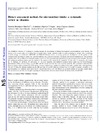Please use this identifier to cite or link to this item:
https://accedacris.ulpgc.es/jspui/handle/10553/44741
| Title: | Dietary assessment methods for micronutrient intake: a systematic review on vitamins | Authors: | Henríquez Sánchez, Patricia Sánchez-Villegas, Almudena Doreste-Alonso, Jorge Ortiz-Andrellucchi, Adriana Pfrimer, Karina Serra-Majem, Lluis |
UNESCO Clasification: | 3206 Ciencias de la nutrición | Keywords: | Dietary Assessment FFQ Validation Vitamins |
Issue Date: | 2009 | Journal: | British Journal of Nutrition | Abstract: | The EURRECA Network of Excellence is working towards the development of aligned micronutrient recommendations across Europe. The purpose of the present study was to define how to identify dietary intake validation studies in adults pertaining to vitamins. After establishing a search strategy, we conducted a MEDLINE and EMBASE literature review. A scoring system was developed to rate the quality of each validation study according to sample size, statistical methods, data collection procedure, seasonality and vitamin supplement use. This produced a quality index with possible scores obtained ranging from 0.5 to 7. Five thousand four-hundred and seventy-six papers were identified. The numbers meeting the inclusion criteria were: for vitamin A, 76; vitamin C, 108; vitamin D, 21; vitamin E, 75; folic acid, 47; vitamin B12, 19; vitamin B6, 21; thiamine, 49; riboflavin, 49; and niacin, 32. The most frequently used method to ascertain dietary intake was the Food Frequency Questionnaire (FFQ), whereas dietary records (DR) and 24-h recalls were the most used reference methods. The correlation coefficients (CC) between vitamin intakes estimated by FFQ and the reference method were weighted according to the study's quality index and ranged from 0.41 to 0.53 when the reference method was the DR and from 0.43 to 0.67 when the reference was 24-h recalls. A minority of studies (n 33) used biomarkers for validation and in these the CC ranged from 0.26 to 0.38. The FFQ is an acceptable method of assessing vitamin intake. The present review provides new insights regarding the characteristics that assessment methods for dietary intake should fulfil. | URI: | https://accedacris.ulpgc.es/handle/10553/44741 | ISSN: | 0007-1145 | DOI: | 10.1017/S0007114509993126 | Source: | British Journal of Nutrition [ISSN 0007-1145], v. 102 (sup. 1), p. S10-S37, (Diciembre 2009) |
| Appears in Collections: | Artículos |
SCOPUSTM
Citations
88
checked on Jun 8, 2025
WEB OF SCIENCETM
Citations
85
checked on Feb 8, 2026
Page view(s)
53
checked on Jan 10, 2026
Download(s)
123
checked on Jan 10, 2026
Google ScholarTM
Check
Altmetric
Share
Export metadata
Items in accedaCRIS are protected by copyright, with all rights reserved, unless otherwise indicated.
